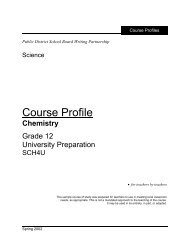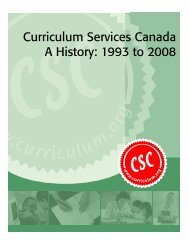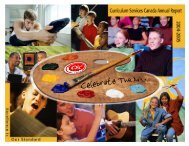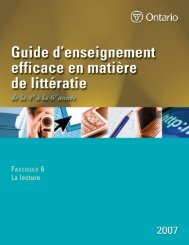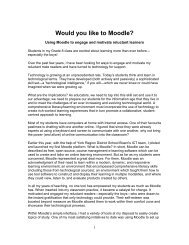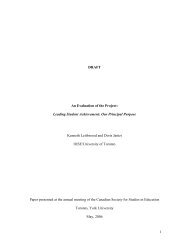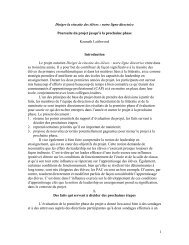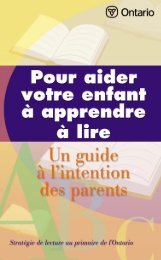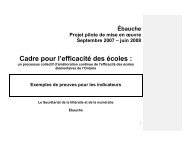Course Profile - Curriculum Services Canada
Course Profile - Curriculum Services Canada
Course Profile - Curriculum Services Canada
You also want an ePaper? Increase the reach of your titles
YUMPU automatically turns print PDFs into web optimized ePapers that Google loves.
LGV.01D - use knowledge of vocabulary and language conventions to speak, write, and read<br />
competently using a level of language appropriate to the purpose and audience;<br />
MDV.01D - use knowledge of the elements, intended audiences, and production practices of a variety<br />
of media forms to analyze specific media works.<br />
Specific Expectations<br />
LI1.01D - describe information, ideas, opinions, and themes in print and electronic texts they have read<br />
during the year from different cultures and historical periods and in a variety of genres, including<br />
novels, short stories, plays, poems, biographies, short essays, articles from newspapers, magazines, and<br />
encyclopedias;<br />
LI1.03B - describe a variety of reading strategies and select and use them effectively before, during,<br />
and after reading to understand texts;<br />
LI1.06B - use specific references from a text to support opinions and judgments;<br />
LI1.07D - explain how readers' different backgrounds might influence the way they understand and<br />
interpret a text;<br />
WR3.05D - structure expository paragraphs using a topic sentence, supporting sentences to develop<br />
the topic, connecting words to link the sentences, and a concluding sentence;<br />
LG1.04B - select words and phrases appropriate to informal and formal styles, to suit the purpose and<br />
intended audience of oral and written work;<br />
LG1.05D - recognize, describe, and use correctly, in oral and written language, the language structures<br />
of standard Canadian English and its conventions of grammar and usage;<br />
LG1.06B - recognize, describe, and correct sentence errors in oral and written language;<br />
LG1.07B - recognize, describe, and use correctly, in oral and written language, the conventions of<br />
standard Canadian English for spelling, capitalization, and punctuation;<br />
MD1.02D - identify how elements of media forms are used in a variety of media works and explain<br />
the effects of different treatments;<br />
MD1.03D - compare and explain their own and their peers' reactions to a variety of media works.<br />
Planning Notes<br />
• Students may look at sources other than the class text to find poetry which resonates with them.<br />
Possibilities include other anthologies, CDs or tapes, and the Internet.<br />
• This activity could be assigned in conjunction with Activity 6 (see Appendix 3.2 for a sample of how<br />
this assignment could be structured).<br />
• Students begin this activity in class, but the expectation is that students complete the assignment on<br />
their own time and submit their final product approximately one week later.<br />
• The anthology could be submitted, as a sample, to students’ writing portfolios (see Unit 6, Activity 2).<br />
Prior Knowledge Required<br />
• knowledge of poetic terms and devices as outlined in Activity 1 and 3 of this unit<br />
Teaching/Learning Strategies<br />
• The teacher introduces the concept of personal response to poetry using a teacher or student model.<br />
Concepts to be highlighted include a close and careful reading of the text. While a poet may be inviting<br />
certain readings, other readings may be excluded by the deliberate choice of language and structure.<br />
• The teacher distributes the assignment and outlines the expectations (see Appendix 3.2).<br />
Unit 3 - Page 10<br />
•English - Academic



